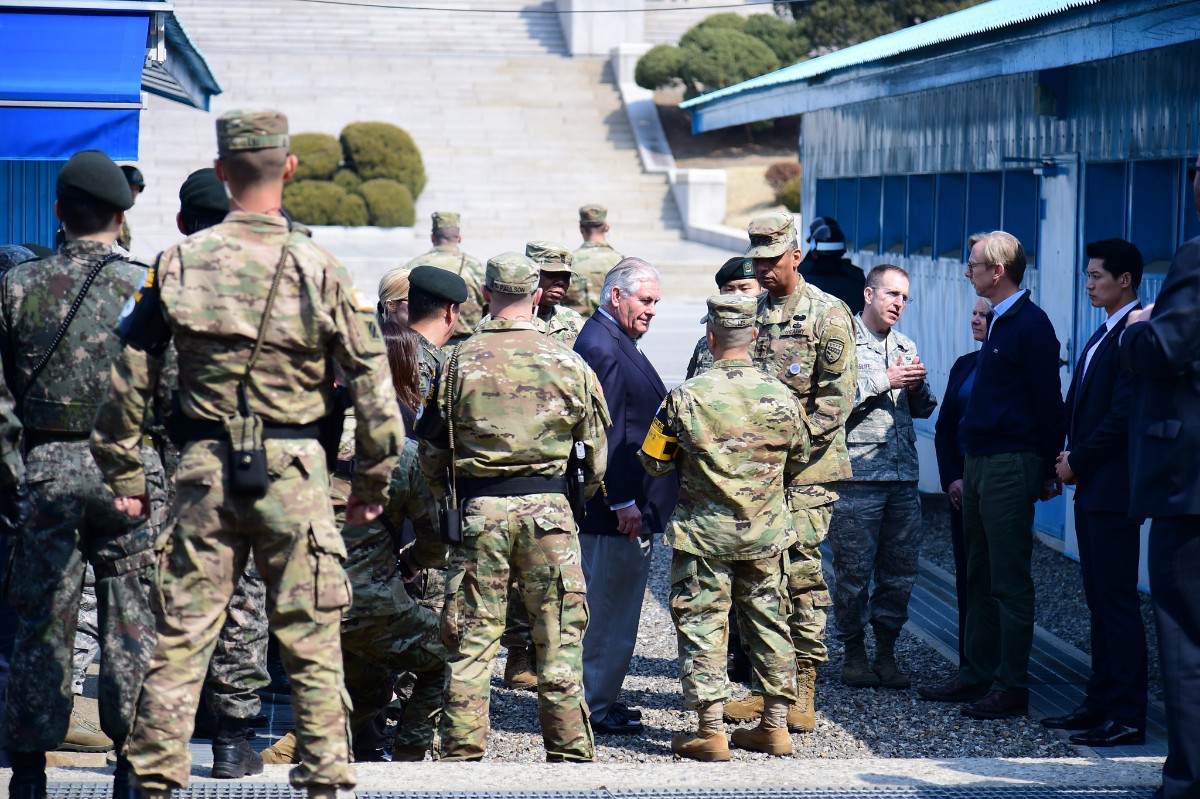 U.S. Department of State
U.S. Department of State
An Alternative to Military Intervention in North Korea
With the news that the Trump Administration has a military option for dealing with North Korea, the Administration must consider alternative scenarios to diffuse tension on the Korean peninsula. Relations between North Korea and the United States have reached a historical low in the wake of North Korea’s recent inter-continental ballistic missile (ICBM) test–one that some experts say could potentially reach as far as Alaska. The latest test is North Korea’s thirteenth of the year. While in power for six years, Kim Jong-un “has tested more missiles than his father and grandfather combined.” North Korea’s unprecedented and alarming escalation from recent years must be addressed differently and more urgently than previous administrations.
The United States and the international community should not allow North Korea to act in this reckless manner without consequences. Military options are too costly, meaning the United States should elect another option to pressure North Korea to the negotiations table. Enacting secondary sanctions on Chinese firms that facilitate North Korea’s nuclear program should be the logical next step in strengthening US strategy against North Korea and has the potential for real damage to their nuclear program funding.
Military Intervention: More Harm than Good
The costs of military intervention to impede North Korea’s nuclear program–in the form of a preemptive strike on the North Korean nuclear arsenal or the deployment of ground forces–are simply too dangerous and logistically implausible. North Korea has spread out its weapons-grade uranium and plutonium stockpiles, warheads, and delivery vehicles around the country, making it very difficult to destroy its entire nuclear program in a single strike. The threat of instigating a subsequent nuclear war could be heightened after any sort of nuclear strike. At the very least, military intervention could provoke the collapse of the Kim regime and a subsequent power vacuum and refugee crisis–which neither China, the U.S. nor South Korea are prepared to face. Furthermore, many policy experts would agree that despite Kim Jong-un’s antagonistic behavior, he is a rational actor and will ultimately be deterred by the threat of US military intervention. As stated in a previous ASP blog post: “the eruption of a New Korean war will undoubtedly end with the destruction of the North Korean regime; a regime which stakes its existence on making the cost of an invasion of the North higher than its benefit.” Therefore, military intervention should only be undertaken if absolutely necessary, for the sake of the Korean peninsula and overall global security.
China’s Role and the Need for Secondary Sanctions
Despite recent promising reports regarding a decline in coal imports from China to North Korea, China continues to directly fund Kim Jong-un’s lawless autocracy. Exports from China to North Korea, however, increased 29%, illustrating a robust trade relationship between the two states. As North Korea’s primary trade partner and regional ally, China is responsible for 85-90% of North Korea’s imports and therefore wields immense power over North Korea’s fragile economic stability. While the Chinese have pledged cooperation with the United States, they have proven to be hesitant in the implementation phase of measures that could seriously threaten the viability of the North Korean regime. The United States should continue to press China to curb the North Korean nuclear program.
While China undoubtedly has an interest in the survival of the regime for its security, the United States can try to incentivize the Chinese to further limit trade with Pyongyang. Similar action has been taken before and has produced limited results, therefore the United States must take more drastic measures and enact secondary sanctions—economic sanctions that target Chinese firms and banks that provide money and assistance to North Korea. If secondary sanctions are enacted, however, the United States must be prepared to deal with the diplomatic fallout and China’s potential retaliation against US businesses.
According to Reuters, a US official said that sanctions against small Chinese banks could become a reality in the next few weeks, as the Trump Administration grows frustrated with the lack of Chinese commitment. This is contingent on the scheduled talks taking place this week on economic matters. Pressuring China with the threat of secondary sanctions on its largest financial institutions could provide an impetus for their cooperation on North Korea.
Conclusion
If the funding continues, North Korea will develop its nuclear program until it possesses a functional nuclear-tipped ICBM. The threat needs to be extinguished before it explodes, and thus the United States must convince Chinese firms to end their business with North Korea to reduce the threat of a conflict on the Korean peninsula.





